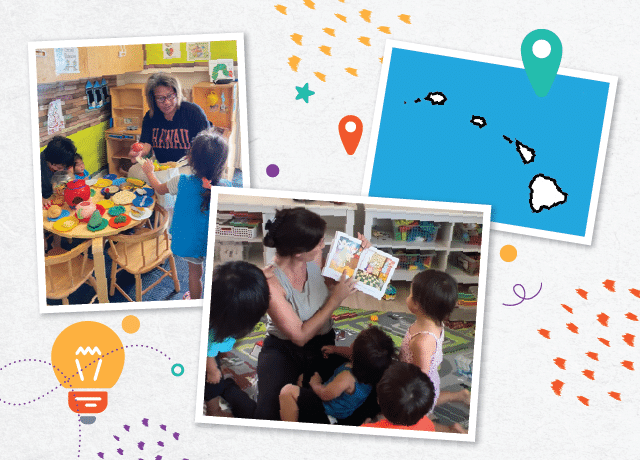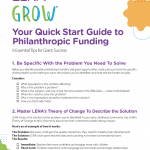“One of my students, he came in and told me, ‘Auntie, I’d like to read to you.’”
The boy didn’t know the words — he’s only four — but he “read” the book anyway. He narrated the illustrations. He even enlisted his teacher to take part.
“Okay, Auntie,” he started. “Repeat after me: ‘Once upon a time … ’” She happily repeated him.
“Smiling monster,” he continued. “Okay, Auntie, show me ‘smiling monster.’” She happily showed him a smile. …
Teaching since 1984, and still learning
Melenau Haiola teaches at Rainbow School in Kahuku, Hawaii. It’s a NAEYC-accredited school, across the street from the fire station and just a short walk to Makahoa Point on the northern tip of O’ahu. Haiola has been at Rainbow School since 1984, so it’s often the case that her kids’ parents were in her class as well.
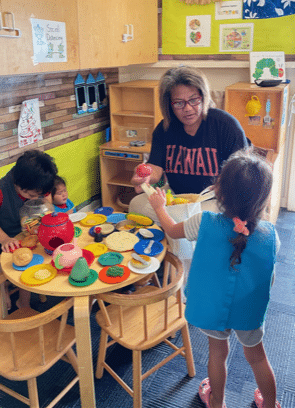
“The parents are so happy,” Haiola said. “They feel comfortable knowing I’m still teaching their children. They always tell me that.”
Haiolo earned her Child Development Associate (CDA) credential in 1989, and then an associate’s degree in early childhood education in 2010. She’s been an early educator for so long, yet she is still learning new things. One example: the dialogic reading that the 4-year-old above was demonstrating so well.
“With the dialogic reading, it’s giving the children the experience of interacting with us while we’re reading the book,” she said. “Before, I was just reading, and they would just sit and listen.”
The “before” she’s referring to is the time before she participated in a professional development program called LENA Grow.
LENA Grow is an evidence-based professional development program designed to help infant, toddler, and preschool educators create robust language environments. At the heart of the program are strengths-based coaching sessions and a piece of innovative technology sometimes referred to as a “talk pedometer.”
Haiola completed the program in the early summer of 2022. She’s one of more than 6,500 early educators to participate in LENA Grow since 2016.
[quote]
“As a teacher, you always want to see more out of a child. What else are they capable of?” she said. “LENA Grow raises the bar, raising how we teach the children: to be more sensitive, to be more compassionate, to develop new learnings to apply.”
Haiola attributes that mindset to her coach, Mei Ou, support manager at the nonprofit organization Family Hui Hawaii. Every Friday for the duration of the LENA Grow program, the two met to review the data produced by the “talk pedometer.” The reports automatically analyze the classroom’s language environment, both at the classroom level and the level of each individual child’s experience. The coaching sessions also introduce new strategies for increasing interactions with particular children or at particular times of the day, as well as new strategies for engaging families in talking about their child’s development.
“She has a wonderful positive attitude towards learning,” Ou said of Haiola. “She gets excited when she sees the LENA reports, and she’s eager to set goals and work very hard to achieve them.”
The idea behind these data-informed goals is that more interactions, or conversational turns, develop into more nurturing relationships, not to mention the many other positive outcomes backed by research. On the whole, research has raised red flags about the state of teacher-child interaction in early childhood education, with approximately one in five children experiencing language isolation. LENA Grow is designed to deliver clear and actionable feedback on how teachers interact with the children in their care, leading to improved child outcomes.
In addition to those child-level outcomes, the LENA Grow program has also been shown to improve teachers’ professional outlook. In one independent evaluation, for example, teachers participating in LENA Grow reported significant increases in job satisfaction and self-efficacy. Larger analyses of more LENA grow teachers show similarly promising results. Haiola’s story is just one example of what this data looks like in real life, and with the early childhood education workforce facing unprecedented challenges, these results are significant.
“Sometimes just being recognized as a teacher teaching at the preschool level is all the boost we need to continue on with it, seeing their development from preschool all the way through college,” Haiola said. “It’s just amazing. It gives you a humble feeling that you had a part in it. That’s why I still work as a teacher at Rainbow School, why I’m still working in early childhood education.”
A “leap of faith” and a long-awaited return to early childhood education
On the opposite end of O’ahu, Monique Takayesu Ah Nee runs a family child care (FCC) out of her home in Ewa Beach. “My living room is my child care center,” she said. Her house is outside Honolulu, just a stone’s throw from Mamala Bay and within earshot of all the international airport’s departing and arriving jets.
Takayesu Ah Nee’s professional path has taken a few twists and turns. After stints as a teacher’s aide and lead preschool teacher, she stepped away from early childhood education when she had her first child. The decision was difficult, she said, but it was also all but made for her. At the end of the day, the teaching position simply didn’t provide enough income.
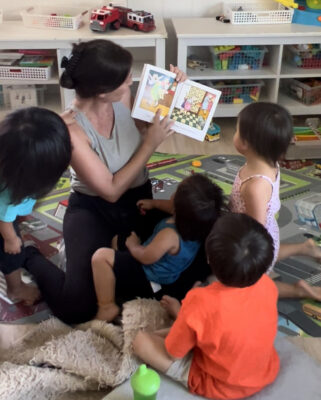
Things changed about 15 years later, when she found herself working in a call center while pregnant with her fourth child.
“I’ve always wanted to have my own family child care,” she said. “I took a leap of faith and said, ‘This is what I want to do,’ so I didn’t go back.”
And she hasn’t. In 2023 her business, like her son, will turn five years old. He’s aged out of her care and now attends preschool, but the FCC is still going strong. She teaches five children, ranging from four months to four years.
Takayesu Ah Nee admits that the “leap of faith” she took was scary. “If you’ve never done it, there’s always that fear,” she said. “But there’s so much help out there. There are so many people who are willing to help.”
Among those people was Mei Ou, who would eventually serve as Takayesu Ah Nee’s LENA Grow coach, just as she would for Melenau Haiola. When Takayesu Ah Nee was just starting her business, Ou worked for PATCH, the local child care resource and referral agency. She was one of so many community members, Takayesu Ah Nee said, who was instrumental in providing the mentorship necessary to get her FCC off the ground. Four years later, she jumped at the opportunity when Ou brought LENA Grow to her attention.
“It’s a great program,” she said. “It opened up my eyes. I was doing some of it already, but I didn’t know how important it was for their brain development.”
Even though her own son was already in preschool and didn’t participate directly, Takayesu Ah Nee sees how he has reaped plenty of collateral benefits.
“He was a little delayed in his speech, and now he’s completely caught up,” she said. “It’s been beneficial for all the families, though. All of them have flourished and have been talking more.”
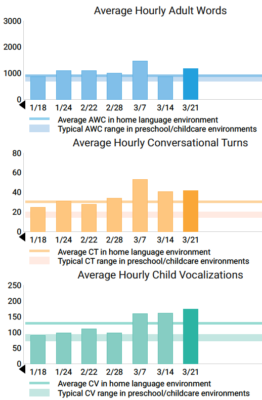
Likewise, she herself has flourished.
“Seeing my progress made me feel like I am expert in language development and in my field,” she said. “I felt very confident knowing that my conversations with the children are helping them develop. … It was really motivating.”
The proof of that progress shone through in her LENA Grow reports, showing that the children’s vocalizations and conversational turn rates continued to increase from one week to the next, even as her own word count remained steady. That means she took the 14 Talking Tips to heart, really engaging the children in conversation and giving them time to respond.
“Monique truly puts children’s learning, growth, and development as her priority,” Ou said. “She observes the children and asks for recommendations to support the children’s specific needs. She sees every recommendation as a step to increase the quality of her child care home.”
One child in particular, a young toddler, showed remarkable gains. Over the course of the program, they saw nearly a two-fold increase in the conversational turns they experienced. That’s far from inconsequential. LENA’s researchers have found 18-24 months to be especially important, as interaction levels at that age are predictive of academic outcomes 10 years down the road.
Between the coaching sessions, the data reports, and the Talking Tips — she still has the poster taped to the wall, in fact — Takayesu Ah Nee credits LENA Grow with all the positivity she’s seen in her FCC over the past year.
“I probably think about the program every day,” she said.
[callout]
